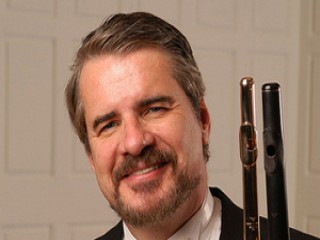
Ransom Wilson biography
Date of birth : -
Date of death : -
Birthplace : Tuscaloosa, Alabama,U.S.
Nationality : American
Category : Arts and Entertainment
Last modified : 2012-03-16
Credited as : Flutist, Conductor, founder and conductor of Solisti New York Orchestra
0 votes so far
Ransom Wilson has carved a niche for himself as both a solo flutist and chamber music conductor. He is acclaimed as a flutist, having performed widely as a recitalist and as a soloist with the world's leading chamber orchestras. In recital, Wilson has appeared regularly in major concert series in Los Angeles, Boston, New York, Dallas, Seattle, and San Francisco and has collaborated with such celebrated soloists as flutists Jean-Pierre Rampal and James Galway, mezzo-soprano Frederica von Stade, soprano Jessye Norman, and harpist Nancy Allen, among others. He is also the founder, music director, and principal conductor of the Solisti New York Chamber Orchestra and holds guest conducting positions with several other orchestras.
Born and raised and Tuscaloosa, Alabama, Wilson early discovered his interest in music. At age 14 he studied at North Carolina's School of the Arts and later he attended the Juilliard School of Music in New York City. While at Juilliard, Wilson chaffed at his training to become an orchestral musician, for a desire to perform solo literature consumed him. Yet while still a student he performed with orchestras on a freelance basis, as well as appearing as a soloist in recital.
Wilson pursued post-graduate studies as an Atlantique Scholar (the equivalent of a the U.S. Fulbright scholar program) in France, particularly so that he could study with celebrated flutist Jean-Pierre Rampal, who is generally credited with the flute's emergence as a solo instrument to rival the piano on concert stages worldwide.
In the early 1970s Wilson made several recordings for the Orin and Musical Heritage Society labels. After his mentor, Rampal, invited him to record an album of flute duets in 1974 and later glowingly endorsed Wilson's work, the young flutist's solo career was launched. In 1978 the fledgling musician was offered an exclusive contract with EMI/Angel. Since then Wilson has made more than ten solo recordings, including two Grammy-nominated albums.
In about 1980 Wilson became interested in conducting and began studying conducting formally with Roger Nierenberg, James Dixon, and Otto-Werner Mueller. "I began conducting because I had to," Wilson told Allan Kozinn in an interview for Ovation. "I just had to. I felt I had reached the end of the flute repertoire. Not that there aren't new pieces being written--there are, of course, and I look forward with relish to each one. But there are few flute works that can claim any real depth. Why hadn't I noticed this earlier? I was having a lot of fun. I had been turned on by the flute in a very visceral way. It was--and still is, for me--a sensual experience to play it. It gives me a satisfaction that I get from nothing else. You're pouring your insides into this little pipe, and somehow it becomes more than that."
Wilson wasted little time in finding a podium. In 1980 he gathered a group of about thirty musicians to form Solisti New York, a chamber orchestra. The group worked together several more times over the next few years--including a tour of the Midwest--and in May 1983 it made its "official" New York debut at Lincoln Center. While the orchestra's repertoire contains some fairly standard pieces for chamber orchestra, such as works by Bach, Handel, Mozart, and Vivaldi, it also includes twentieth-century pieces by Samuel Barber, Aaron Copeland, Ralph Vaughan Williams, Francis Poulenc, and Zoltan Kodaly, among others.
An advocate of contemporary music, Wilson has commissioned works by a number of composers, including Peter Schickele, Joseph Schwanter, Jean-Michel Damase, Carlos Surinach, and Deborah Drattel. Wilson has especially brought to the podium his interest in minimalism, a style of twentieth-century music in which a minimum of material is repeated to the maximum effect. Solisti New York has performed and recorded works by minimalist composers Steve Reich and John Adams in what have been billed as "Meet the Minimalists" concerts.
While many instrumentalists in the 1980s have been harshly and often justly criticized for their conducting efforts, reviews of Wilson's work have generally been favorable. Wilson prefers to separate his conducting from solo performing for he is uncomfortable assuming both responsibilities simultaneously as was often done by the principal violin players of the eighteenth century. In addition to his formal training, Wilson credits much of his success with his ability as an instrumentalist to work well with the musicians under his baton. "I think of my role up here on the podium as akin to that of a great movie director, which is to work with an extra-ordinarily talented group of people, and to help them be seen in the best possible light," he explained to Kozinn. "That's a bit different from the way an autocratic conductor sees his job; but coming form the standpoint that I do, I think I have a lot more respect for the musicians than many conductors do. I prefer my time with the orchestra to be more relaxed, friendly, and productive." Wilson welcomes orchestra members' suggestions on tempos, dynamics, and other musical matters.
Not only does Wilson conduct, he assumes the responsibilities of management for Solisti New York, at times even supporting it financially. Wilson also serves as artistic director of the OK Mozart Festival in Bartlesville, Oklahoma, where Solisti New York is in residence each June, and as music director of the Tuscaloosa Symphony Orchestra. As his conducting activities have increased, Wilson has reduced the number of flute engagements, which at one time numbered more than one hundred per year.
















